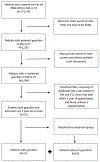Guardianship Before and Following Hospitalization
- PMID: 35072897
- PMCID: PMC10281591
- DOI: 10.1007/s10730-022-09469-9
Guardianship Before and Following Hospitalization
Abstract
When ethics committees are consulted about patients who have or need court-appointed guardians, they lack empirical evidence about several common issues, including the relationship between guardianship and prolonged, potentially medically unnecessary hospitalizations for patients. To provide information about this issue, we conducted quantitative and qualitative analyses using a retrospective cohort from Veterans Healthcare Administration. To examine the relationship between guardianship appointment and hospital length of stay, we first compared 116 persons hospitalized prior to guardianship appointment to a comparison group (n = 348) 3:1 matched for age, diagnosis, date of admission, and comorbidity. We then compared 91 persons hospitalized in the year following guardianship appointment to a second matched comparison group (n = 273). Mean length of stay was 30.75 days (SD = 46.70) amongst those admitted prior to guardianship, which was higher than the comparison group (M = 7.74, SD = 9.71, F = 20.75, p < .001). Length of stay was lower following guardianship appointment (11.65, SD = 12.02, t = 15.16, p < .001); while higher than the comparison group (M = 7.60, SD = 8.46), differences were not associated with guardianship status. In a separate analysis involving 35 individuals who were hospitalized both prior to and following guardianship, length of stay was longer in the year prior (M = 23.00, SD = 37.55) versus after guardianship (M = 10.37, SD = 10.89, F = 4.35, p = .045). In qualitative analyses, four themes associated with lengths of stay exceeding 45 days prior to guardianship appointment were: administrative issues, family conflict, neuropsychiatric comorbidity, and medical complications. Our results suggest that persons who are admitted to hospitals, and subsequently require a guardian, experience extended lengths of stay for multiple complex reasons. Once a guardian has been appointed, however, differences in hospital lengths of stay between patients with and without guardians are reduced.
Keywords: Capacity; Family conflict; Guardianship; Hospitalization; Length of stay.
© 2022. This is a U.S. government work and not under copyright protection in the U.S.; foreign copyright protection may apply.
Conflict of interest statement
Figures


References
-
- ABA-APA Assessment of Capacity in Older Adults Working Group. (2006). Judicial determination of capacity of older adults in guardianship proceedings: A handbook for judges. Chicago: American Bar Association and American Psychological Association.
-
- Anderson GO, & Thayer CE (2018). Loneliness and social connections: A national survey of adults 45 and older. Retrieved January 13, 2022, from https://www.aarp.org/content/dam/aarp/research/surveys_statistics/life-l...
-
- Aviv R (2017). How the elderly lose their rights. The New Yorker. Retrieved January 13, 2022, from https://www.newyorker.com/magazine/2017/10/09/how-the-elderly-lose-their...
-
- Braun V, & Clarke V (2016). Thematic analysis. In Lyons E & Coyle A (Eds.), Analysing qualitative data in psychology (2nd ed., pp. 84–103). Thousand Oaks: Sage.
MeSH terms
Grants and funding
LinkOut - more resources
Full Text Sources
